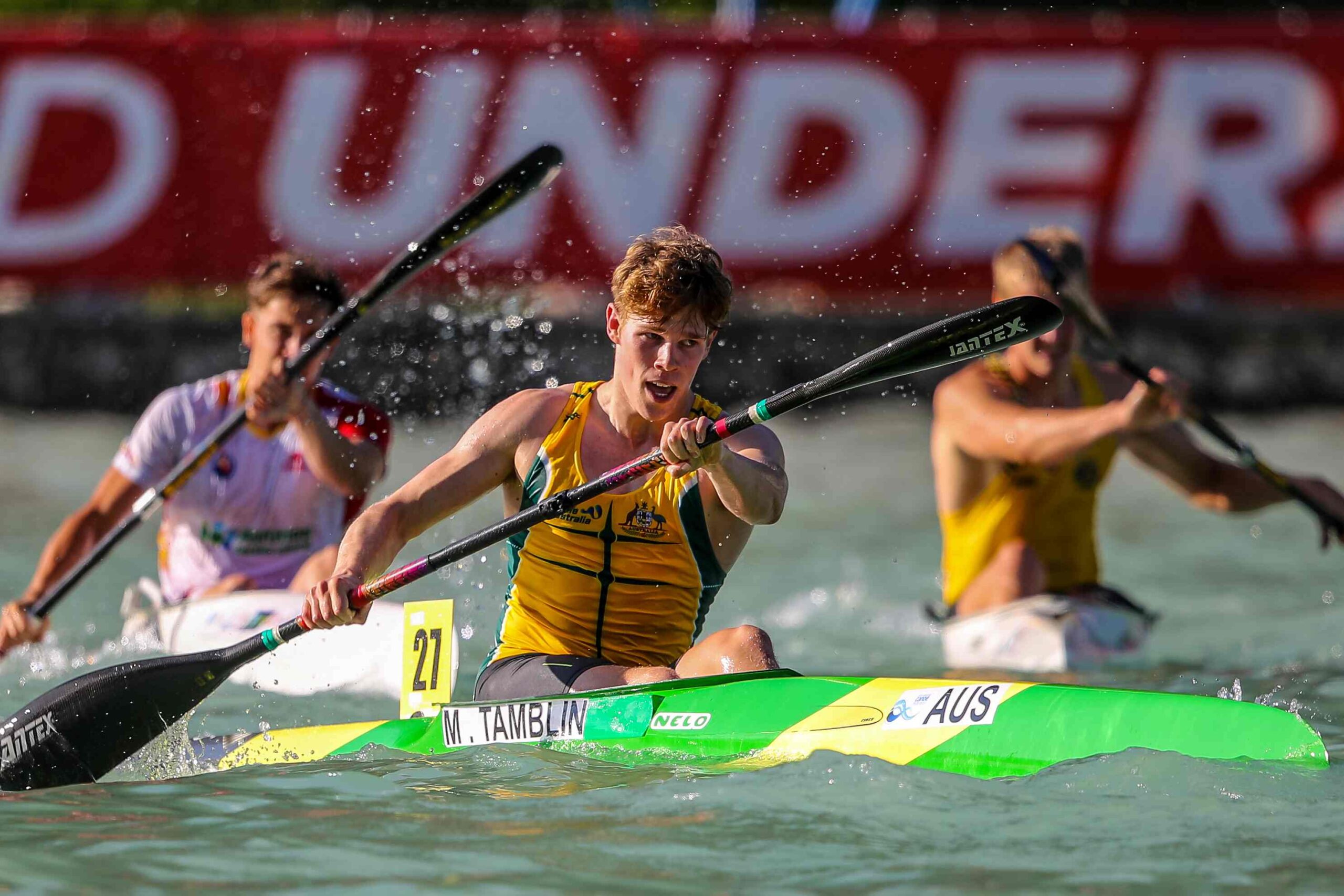There are countless benefits to this journey. Training under coaches who believe in you, and alongside athletes who constantly push your limits helps build personal qualities. I have achieved a level of discipline, mental strength, resilience, professionalism and self-confidence that I doubt I would have gained without paddling.
Mitchell tamblin – Sprint/mARATHON PADDLER
If you want an example of journey being the ultimate teacher, look no further than Mitchell Tamblin. Mitchell has risen through the paddling ranks by making every challenge, setback, and achievement a learning experience, and like all disciplined students, it pays off.
We enjoyed interviewing Mitchell about his paddling journey – his dreams, challenges, loves and learnings. Want the key ingredients for success in paddling and life? Mitchell has a winning recipe!

Paddling dreams
Us: What is your ultimate paddling dream?
Mitchell: Although my ultimate dream is to compete at the Olympics and win a gold medal, it’s finding joy in the process, achieving short-term goals, learning new things, and continuously growing as a person that fuels my love for paddling.
From my recent experience with guitar, I’ve learned that while rushing the process can produce quick, polished results, it rarely leads to long-term satisfaction. By focusing on the journey rather than just the outcome, I find the pursuit to be more challenging and rewarding.
Why paddling?
Us: Why did you take up paddling?
Mitchell: My parents have been incredibly supportive of my sporting endeavours throughout my life. I’ve reached regional level in swimming, achieved second dan in taekwondo, and tried countless other sports, including skiing, rugby, football, soccer, golf, cricket and much more. Without my parents, I wouldn’t have ever had the opportunity to have taken sport so far.
After transitioning into high school, I discovered that they had an academy specializing in marathon kayaking. So, I decided to give it a try.
I believe the skills, strength and fitness I developed in swimming helped me to quickly pick up kayaking, and I placed second in my first marathon competition within a month of training. Just five months later, after numerous competitions, my coach, Tim Scott, encouraged me to try the National Championships. And at the end of the year, I competed in several national events, winning the national title in the K1 U12 lightning race and came third in the U12 K2.
In recognizing my passion for paddling, a year later (in 2018), I made the tough decision to focus solely on this sport. After moving back to Australia in 2021, I transitioned into Sprint Kayaking under the coaching of Ramon Andersson.

What aspect of paddling do you enjoy most?
Us: What do you enjoy the most about paddling?
Mitchell: It’s a feeling that’s hard to describe. I ask myself every day: Do I really enjoy the 4 am mornings? Do I like my inconsistent work schedule, the injuries, sleepless nights, the stress and the unpredictability? The challenges are an integral part of training. When a technical issue you’ve been working on for a year finally clicks, it’s just another step towards reaching your potential.
Paddling benefits
Us: What benefits have you experienced from paddling?
Mitchell: There are countless benefits to this journey. Training under coaches who believe in you, and alongside athletes who constantly push your limits helps build personal qualities. I have achieved a level of discipline, mental strength, resilience, professionalism and self-confidence that I doubt I would have gained without paddling.

Paddling setbacks / challenges
Us: Are there any difficulties you have faced in chasing your dream?
There are challenges as with anything in life. It just depends how you choose to respond to those challenges that determine the longevity of your time in the sport.
Last November I had a series of unfortunate events: a car crash followed by a bike accident, resulting in a concussion and a month of rehab. After getting back to partial strength I competed at GP1, where I realised my most successful 500m race plan, achieving several good results.
However, just two days later, I was struck by the flu, which left me bedridden for a week and unable to train for two months due to fatigue. This setback led to significant weight gain and my lowest fitness level ever, culminating in an unsuccessful nationals performance.
Rather than viewing this as a setback, I chose to remain positive and see it as an opportunity for growth. I focused on refining my on-water technique, adjusting paddle and leg measurements, eliminating bad training habits, and addressing obstacles that were impeding my progression.
During my recovery, I spent weeks critiquing my performance and consulting with the WAIS team about a training plan for the year. Within just a few months of returning to kayaking, I had significantly improved my fitness level, reduced my weight, increased my strength, and continued to work on correcting the bad habits that had been holding me back.
Without the support of such a dedicated team: Ramon Andersson, Andrew Crothers, Saia Wood-Halafihi, Cruz Hogan, Kirstie Walsh, Brett Slocombe, Tarryn Dickerson and the WAIS squad, coming back from such a setback would have been extremely difficult and I am so thankful to have them support me through every step.

The WA paddling experience
Us: Tell us about your experience paddling in WA?
Mitchell: Even though just over half of my paddling career has been spent in WA, it has been an amazing experience. The ideal weather year-round for flatwater training, along with the sprint regatta course at Champion Lakes in Perth and access to hundreds of kilometres of rivers for training and racing, makes paddling in WA truly enjoyable.
Despite having separate races for different ages and skill levels, the Paddle WA community remains incredibly connected. This sense of belonging is crucial, especially for someone starting out in the sport, as it can be quite daunting to begin alone feeling like there is so much to learn.
Advice to new / existing paddlers?
Us: What is your advice to someone who wants to take up paddling?
use your resources
Mitchell: Whether it’s paddling or any other sport, absorbing as much knowledge as possible from available resources and continually learning from others is crucial. I also believe that being self-critical is essential for success because it drives constant improvement. This self-assessment helps you identify issues not only through recordings, video sync etc, but also through race reports and on- and off-water training.
find your calling
Find your calling. There are many different paddling disciplines in WA, including sprint, marathon, whitewater, slalom, downwind, surfski, and recreational kayaking. I started with marathon racing for three years, then explored surfski/downwind, whitewater, and slalom before dedicating myself to sprint paddling for the past three years.
self-care
Addressing tasks that many people struggle with – such as getting over 8 hours of sleep, maintaining adequate hydration and nutrition, stretching, pre-race organisation and preparation, and mental readiness – will set you apart from the competition. Though perfecting these is a different story.
paddling’s for everyone
Enjoy what you do, whether it’s a weekly float on the river or training multiple times a day. Everyone can enjoy paddling.
Top 5 Achievements
| 1 | Sprint World Championships for Australia – 4th in the U18 Mixed K1 5000m relay, 12th in the U18 K4 500m (3rd in the B Final) |
| 2 | Asia Pacific Championships – 1st in the U18 K4 500m, 1st in the U18 Mixed 200m Relay, 3rd in the K2 500m |
| 3 | Oceana Championships – 1st in the U18 K4 500m, 1st in the U18 K4 200m, 2nd in the U18 K2 500m. |
| 4 | Competed for the British Team at the French Nationals in the U14s K2 12km, securing 2nd place. |
| 5 | Placed 1st in the U12 Waterside A (22km, 21 portages), B (28k, 25 portages), C (37km, 25 portages) in England. |
Thank you, Mitchell!
Thank you so much for sharing your experience with us, Mitchell. It has been a privilege to get an insight into your process, and we look forward to seeing your incredible journey unfold.

